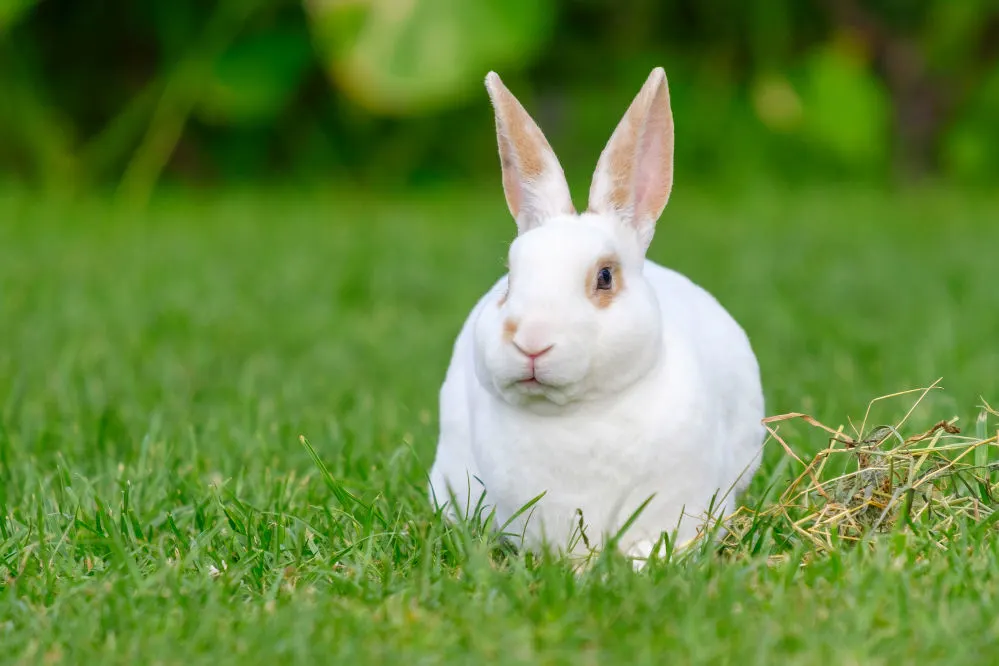Rabbits are some of earth’s most delicate and softest creatures, barely making a sound. They’re so quiet; if you’re used to cats or dogs, you might even feel your bunny is unhappy. Luckily, that’s not the case — it’s just the nature of these adorable fluff balls.
There are ways to become an even better rabbit owner by paying attention to their body language and the rare occasion they make a toot. This post will focus on one of the most common rabbit noises, the reasons behind it, plus a few other sounds they may make.
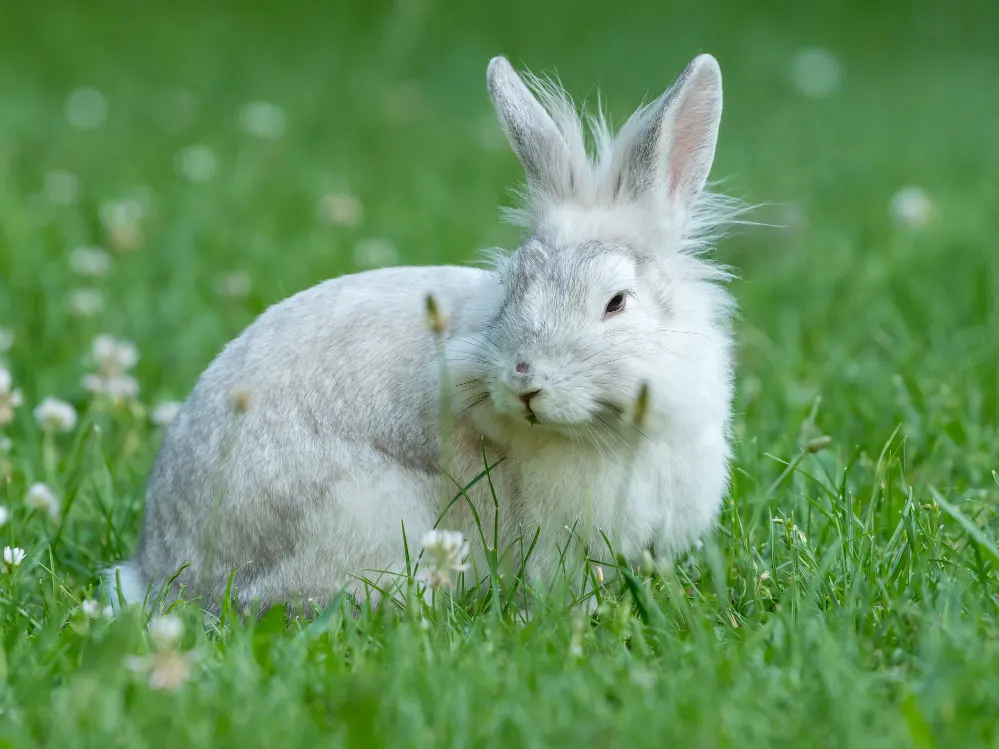
So if you were wondering, “Why is my rabbit grunting?” then keep reading so you can become a master at decoding your pet bunny’s language.
PS: Learn more about your furry friend by looking at when rabbits sleep.
What does rabbit grunting sound like?
A bunny grunt is short, deep, and has a harsh tone to it. This can often be mistaken for a honk, which is more of a positive, happy sound associated with play and excitement. You’ll notice a grunt is usually repeated and accompanied by bites, kicks, and scratches.
It’s safe to say that the grunting noises of a bunny are a sign of aggressive behavior. But don’t fret — you likely just have a moody bun in the house. However, keep reading if your spidey senses tell you there’s more to it.
Why do rabbits grunt?
Your pet rabbit grunts for a reason, but it may have several meanings. Let’s have a closer look at all the reasons why a rabbit grunts.
1. Fear
When a rabbit growls, hisses, or grunts, it could be a sign of fear. Since rabbits are prey animals, they must be constantly aware of nearby predators.
This is not exclusive to wild rabbits, as your indoor bunny’s instinct is to be bright and alert. This allows your bunny to listen attentively for any signs of danger. In fact, you should be concerned when they’re lethargic and stressed.
This type of rabbit behavior is typical, but constant fear in pet bunnies shouldn’t be ignored as it can lead to gut stasis and illness like anorexia.
2. Anger
One of the main reasons your bunny may let out an angry grunt is because they’re (you’ve guessed it) angry. A furious bun-bun may be the result of loud noises, territorial behavior, or they’re grumpy because of hunger.
A good idea to reduce their frustration is to allow them their personal space, make their environment more relaxed and give your pet their favorite treat.
3. Pain
Any harsh type of vocal sounds could be a sign of pain. It’s pretty hard to figure out when a rabbit is injured or suffering from health problems as they hide these feelings well (again, this is in their nature). So if you do hear a rare loud grunt, it could mean they’re in extreme pain.
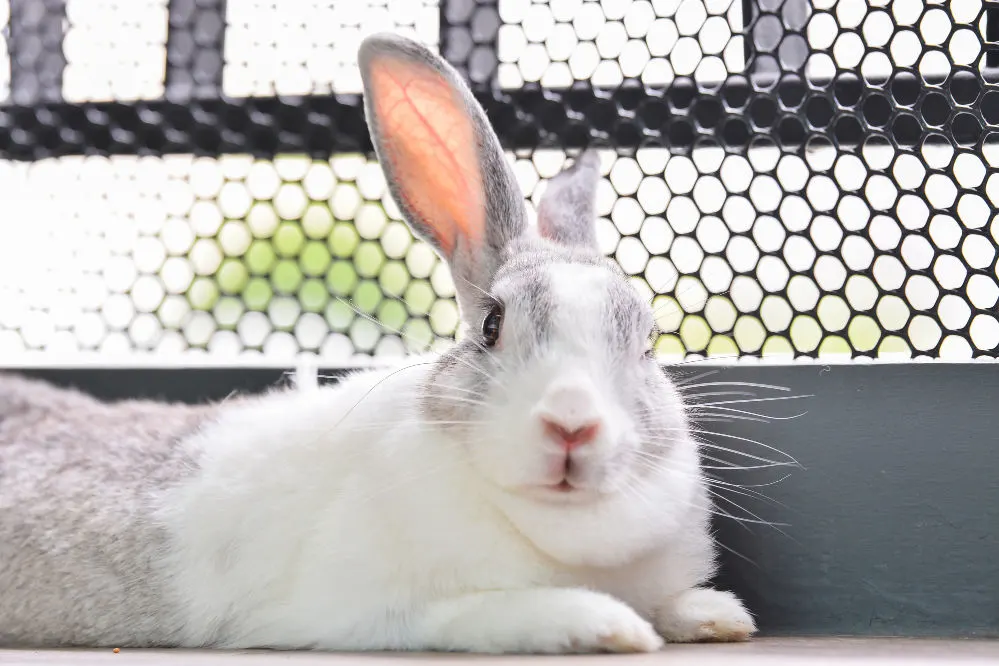
Other signs of pain include eating less, shying away from others, and shivering. You can check your bunny for any injuries or wounds, but it’s best to contact a vet if you don’t find any.
4. Territorial
Territorial disputes are among the most common reasons rabbits may grunt at you or other fuzz balls. This is especially common when new rabbits or unfamiliar people enter their space. It’s a warning signal to show you they’re uncomfortable with the invasion.
When dealing with a new furry family member, you may have to keep your bunnies separate for some time. If they grunt at you, try approaching them slower with a treat, and you might just bribe your bunny to stop groaning.
5. Mating
Ah, the famous mating grunt of a sexually matured rabbit. Both male and female bunnies will do this as part of their mating ritual (you’ll see some crazy stuff during these rituals). A pregnant doe is also prone to grunting, even more so when her kits are born to show protection.
Honestly, there’s not much you can do to end this behavior, and it occurs more frequently in an unneutered bunny.
6. Disapproval
Like your human family, your furball won’t be happy with you 24/7. At times they will show a sign of disapproval by grunting at you. They could be saying, “Put me down. I want to hop further,” or “Why don’t you feed me enough, human?”.
Sometimes you’ll get a grunt and even a nip when cleaning out your rabbit’s hutch since they really don’t like it when you rearrange things. Yes, they’re total drama queens. So a little grunt here and there, especially if you pick them up, just means they’re not happy.
7. Health issues
Similar to pain, rabbits hide their health issues very well. Reoccurring grunts and abnormal rabbit behavior may reveal an underlying problem. If you think your pet needs medical attention, contact your vet immediately.
How to stop a rabbit’s grunting?
Grunting sounds are entirely normal for house rabbits, so you don’t have to stress too much if it’s occasional. However, if it is too often paired with aggressive behaviors such as nipping or occurring regularly, you’ll have to start paying close attention to your pet.
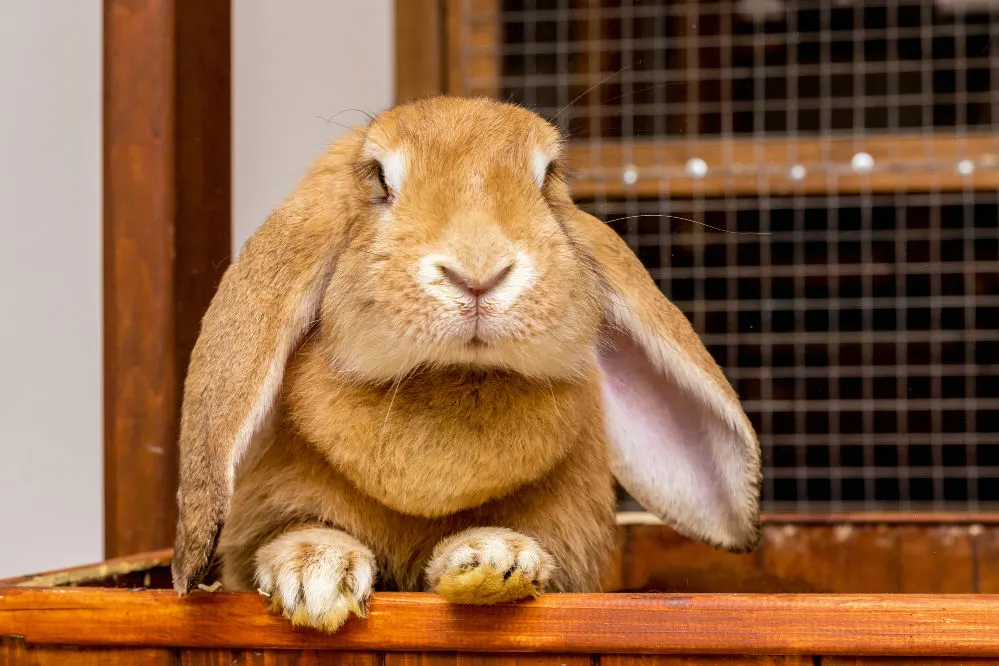
They could be trying to communicate that something is wrong, and it might be time to visit your rabbit’s veterinarian.
Here are some tips to help you with a grunting rabbit
- Give them some space. No, seriously, leave your bun-bun alone for 15 minutes, and hopefully, they’ll calm down.
- They might just be hungry, so give them their favorite foods.
- Don’t move things, like their litter box, while cleaning their hutch.
- Try not to make loud noises. Provide them with a calm living space.
- Visit your vet if the grunting persists after all your efforts.
Other sounds rabbits may make
Here are a variety of sounds made by bunnies that you can learn. This will help you to distinguish between grunts and other rabbit sounds.
Clucking
A satisfied and happy rabbit often makes a clucking sound similar to a hiccup. A rabbit’s cluck is often heard when they doze off.
Wheezing
If you hear your bunny wheezing continuously, this could be due to difficulty in breathing. A respiratory infection, blocked nasal passages, or any illness causing shortness of breath could cause them to make this sound. This is when you need to seek medical attention.
Squeaking
If your pet bunny gives out a little squeak, it usually means they are scared or alarmed. Baby bunnies often squeak when you pick them up.
Teeth grinding
When your bunny makes a loud teeth-grinding sound, you should contact your vet immediately, as this usually indicates severe pain or stress.
Purring
Much like a cat’s purr, when your rabbit makes this very soft sound (softer than grinding), it shows you they’re content. This is often heard while you pet or stroke them.
Screaming or loud squealing
This is not one of the most common sounds these fuzzy creatures make. So when a rabbit screams, it could indicate extreme pain, danger, or they’re calling out for help.
The rabbit squeal sounds almost exactly like a child’s scream, so when you hear this, something serious has happened.
Whining
A rabbit whines when they want some attention, or they might be curious or annoyed.
How else do rabbits communicate?
Learning rabbit language is much tougher than you think; other pets are far easier to read. But do not let that deter you. Here are some more ways rabbits communicate:
Thumping
Ever noticed your rabbit thump on the ground with its hind legs? This silly demonstration could mean that your rabbit feels overwhelmed or annoyed. Sometimes this could even mean your rabbit is warning the rest of the colony that there’s danger nearby.
When this happens, it’s best to leave your bun in peace or try and win them over with a tasty snack.
Chin rubbing
This one is quite interesting. If you see your bun rubbing their chins on objects or even people around the house or yard, they are marking their territory.
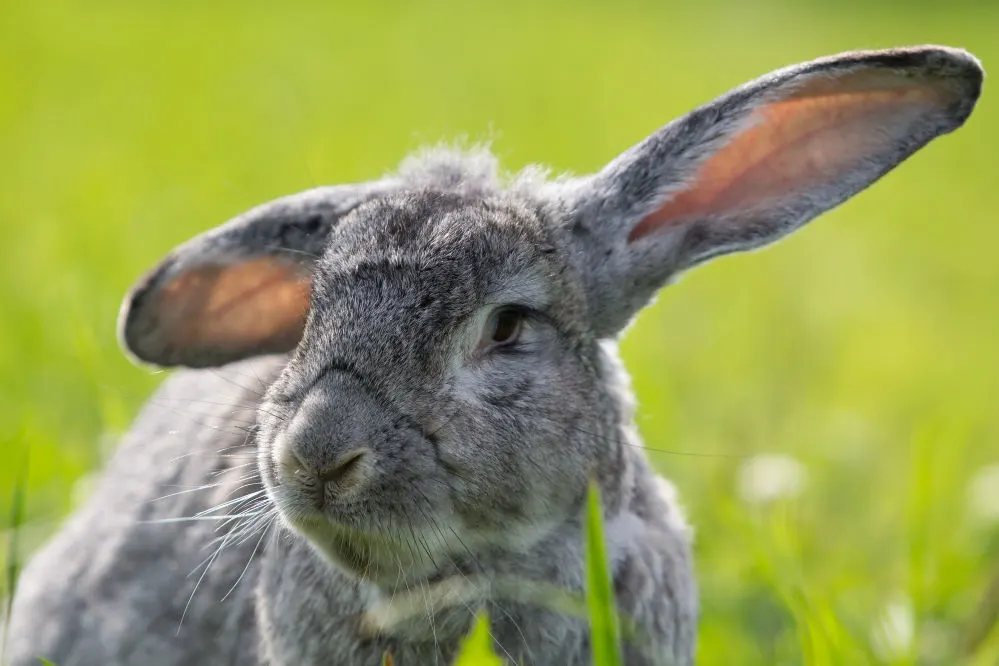
The reason is that rabbits have scent glands on their chins, and the scent can only be picked up by other bun buns. Essentially they are saying, “This person or thing is mine!”. This shows exactly how possessive these cutie-pies can be.
Circling your feet
This action shows you that your rabbit may be seeking your attention. It could also mean they are sexually mature, and it’s time to get them spayed or neutered. Otherwise, they’re simply telling you they want to play.
Next Read: Find out how much it costs to neuter your rabbit.
Acrobatic jumping
If your bunny suddenly bursts into adorable little acrobatic acts, it simply means they are super happy and enjoying life.
Licking
If your furry friend licks you, they’re trying to say, “I like you and approve of you.” So you should feel honored when they do this.
Rabbit grunts explained | Wrapped up
Generally, bunnies are very quiet pets, so any sound they vocalize could be significant or, in most cases, nothing to worry about. Many bunny owners are caught off guard when hearing their rabbits make strange noises, but this is all part of getting to know your bunny’s communication style and habits.
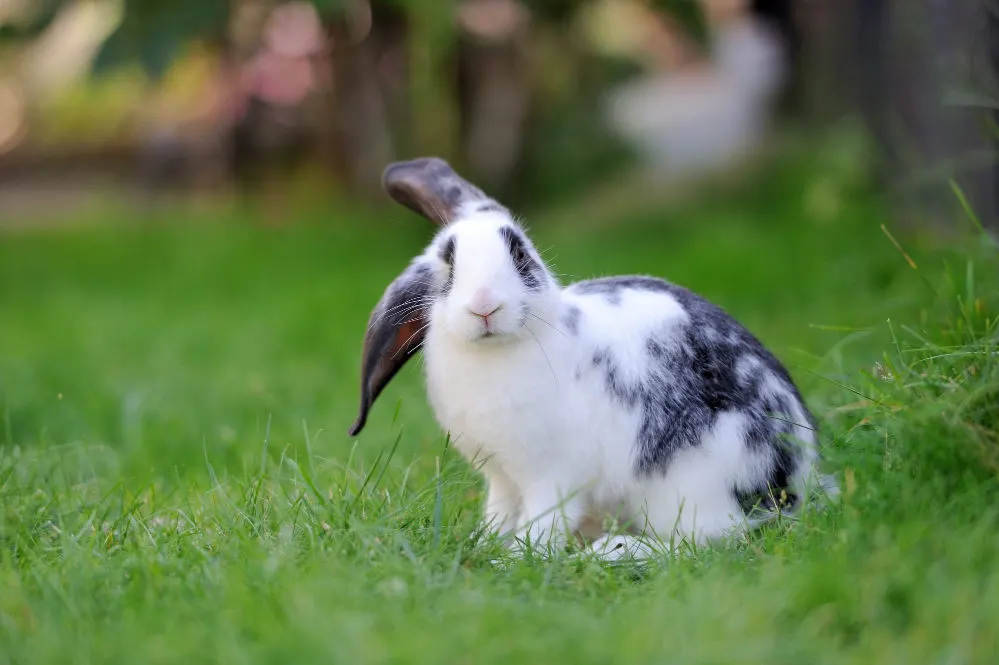
Now that you know the different sounds and their meanings, you’ll know when to ignore them and when to take action. Also, understanding that it’s your rabbit’s way of communicating with you helps you get used to their language and look after them the best way you can.
Next Up: Why is my rabbit breathing so fast?
Steph Dyson is a travel journalist by trade but a lover of all small pets. She’s been a pet mum to everything from gerbils to guinea pigs, rabbits to hamsters, and fish to dogs of all shapes and sizes. She wants to share her years of experience with small pets and make Small Pet Guides the go-to website for pet owners seeking information and care advice.

